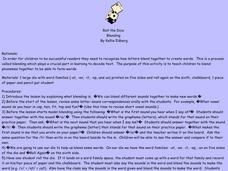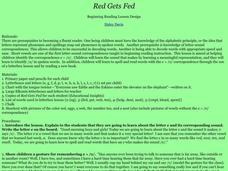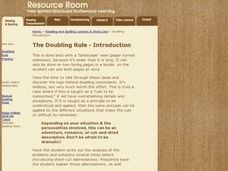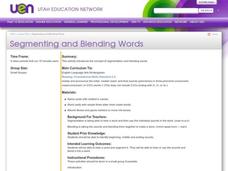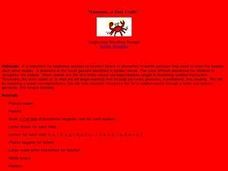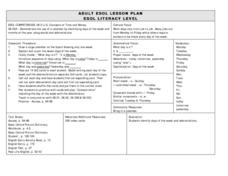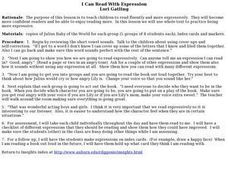Curated OER
What's Behind the Creaky Door?
First graders are introduced to the concept that letters stand for the mouth moves that we make when sounds are made. They practice making the /e/ sound and compare it to the sound a creaky door makes and then try saying the tongue...
Curated OER
Reading Bugs
Review the phonemic sounds of the alphabet letters before examining how to blend letter sounds to make a word. During this teacher-modeled lesson, learners make word bugs out of three phonemes that blend together. As an assessment, read...
Curated OER
Astonishing "A"
Young learners gain phonemic awareness with this quick activity. First, point out what sound you’re focusing on today: /a/. Then spell basic words that use this sound, like fat, bat, cat, etc. As a culminating activity, the whole group...
Curated OER
Indiana Igloo
Your young charges practice identifying the /i/ sound in this lesson. The class looks at words on cards and identifies which word has the target sound. They continue their practice using Elkonin letterboxes to spell words with the /i/...
Curated OER
ADULT ESOL LESSON PLAN--Transportation and Travel.
Students explore and identify specific safety practices when driving (seat belts, child safety, air bags, etc.) with the help of prepositions. They practice many of the techniques shown to them on their vocabulary list of terms with the...
Curated OER
Roll the Dice
Students practice recognizing and blending letters together to create new and unique words in the process of decoding text. They play a game where they roll dice to help blend a variety of words together and create new ones to analyze...
Curated OER
Red Gets Fed
Students practice with the strategy that letters represent phonemes and spellings map out phonemes in spoken words. They work on the phoneme sounds of /a/ and e=/e/ in correspondences with reading. Each student also recites the tongue...
Curated OER
ADULT ESOL LESSON PLAN--Transportation and Travel
Students, after defining a list of vocabulary words on the board, review and identify basic types of transportation (bus, taxi cab, car, plane, and ship) in the United States. In addition, they make a graph of all the different ways that...
Meadows Center for Preventing Educational Risk, University of Texas at Austin
Lesson 8 - Open Syllables
Just like scholars plug something in to close a circuit, they must plug a consonant onto a word to make closed syllables. Help learners distinguish between open and closed syllables with a series of activities that emphasize open...
Curated OER
The Doubling Rule
Learners practice the rule for doubling the final consonant of a word when adding a suffix. Through guided practice and class discussion, they identify the spelling patterns that require letter doubling. Students practice doubling by...
Curated OER
Withdrawing Money From The BAnk
Students discuss the various options for withdrawing money from the bank. Students recognize the importance of keeping accurate bank records and personal banking information secure. This lesson is intended for students acquiring English.
Curated OER
IIII---L-lll-ke---IIII-ke-and-M-IIII-ke
Learners recognize the letter combination i_e by reading and spelling words with letter boxes in this lesson. They say a tongue twister which emphasizes the long /i/ silent /e/ combination. They then listen the story "Kite Day at Pine...
Curated OER
Segmenting and Blending Words
Students listen to words, then segment them into sounds, and hear sounds and blend them into words.
Curated OER
Sound the Foghorn
Learners complete a variety of activities related to the long /u/ sound. As a class they recite a tongue twister, then trace and write the letter U. Students then listen to pairs of words and identify which word contains the long /u/...
Curated OER
"Aaaaaaa...a Fast Crab! "
Young scholars participate in an emergent literacy lesson plan that focuses on the skill of phonemic awareness. The phoneme chosen is the letter "a". They need to correlate the sound to the letter.
Curated OER
ADULT ESOL LESSON PLAN--Family and Parenting
Students explore all the specific requirements that must be followed in order to enroll children in school/day care aged 6-16. In addition, they review the importance of regular school attendance.
Curated OER
Hurry Hurry!
First graders identify the fact that groups of phonemes form spoken and written words. They practice working with identifying words that have the letter "h" and point to its position in words.
Curated OER
Open Wide
Students practice letter(s) map(s) along with phoneme sequences and sounds that make the /o/ sound in both spoken and written formats. They also decode words containing /o/ sounds to work towards becoming more fluent readers beginning...
Curated OER
Aaaaaaaaaa!!! You Scared Me!
Students practice the letter A sound in its different foms. They study a tongue twister that encompasses the letter A sounds. They use letterboxes and bags of letters to sound out different words with the a sound. They listen to a...
Curated OER
Concepts of Time and Money
Students review a calendar and the days of the week along with their abbreviations. They practice identifying, writing and recognizing the days of the week and months of the year by playing the game of "concentration."
Curated OER
Uhh I don't know!
Students engage in an emergent literacy lesson in order to work on the skill of phonem ic awareness. The use of flashcards is essential for the instruction of the lesson. Students match the card with its beginning phoneme.
Curated OER
"Eddie the Excited Elephant"
First graders recognize each letter in the alphabet and the phoneme it makes. They recognize phonemes in spoken words and their corresponding letters or spelling maps and distinguish phonemes in their oral contexts.
Curated OER
Math: Congruent and Similar Figures
Eighth graders use geo-boards to create similar and congruent figures and find their corresponding sides. Using the geo-board paper, they draw the shapes they create on the geo-boards. With partners,students create similar and congruent...
Curated OER
I Can Read With Expression
Young scholars practice reading fluently and expressively through the use of various strategies. After reviewing chunking, decoding, and rereading, students complete an initial read of a novel text. They create a deck of expression cards...







